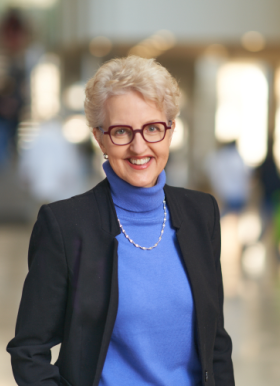
Linda J. Richards AO, FAA, FAHMS, PhD
Chair, Department of Neuroscience and Edison Professor of Neuroscience
- Phone: 314-362-3033
- Email: Linda.Richards@nospam.wustl.edu
Research
Research in the Richards laboratory focuses on the development, plasticity, and function of long-range connections of the cerebral cortex. The corpus callosum is the largest fibre tract in the brain of placental mammals and connects neurons in each cortical hemisphere. We investigate how cellular and molecular/genetic mechanisms regulate brain wiring during development and how brain wiring is altered in congenital corpus callosum dysgenesis (CCD).
CCD occurs in 1:4000 people and can result in profound changes in the structural architecture of brain connectivity due to long-range axonal plasticity that occurs during development. The lab investigates the underlying causes of CCD, how long-range axonal plasticity occurs and how these structural changes in brain wiring impact cognition and behaviour.
Professor Richards is a board member of the International Research Consortium for the Corpus Callosum and Cerebral Connectivity (IRC5) and a scientific advisor and patron of Australian Disorders of the Corpus Callosum (AusDoCC) support group.
In addition to her research, Professor Richards is a passionate advocate for neuroscience. She contributed to establishing the International Brain Initiative, the Australian Brain Alliance and the Australian Brain Bee Challenge and is a board member of the International Brain Bee and a member of the Dana Alliance for Brain Initiatives.
Selected publications
- Edwards TJ, Fenlon LR, Dean RJ, Bunt J, IRC5 Consortium, Sherr EH, Richards L.J. Altered structural connectivity networks in a mouse model of complete and partial dysgenesis of the corpus callosum. NeuroImage. 2020 Aug 15; 217:116868. doi.org/10.1016/j.neuroimage.2020.116868.
- Paolino A, Fenlon LR, Kozulin P, Haines E, Lim JWC, Richards LJ, Suárez R. Differential timing of a conserved transcriptional network underlies divergent cortical projection routes across mammalian evolution. Proc. Natl. Acad. Sci. USA Sciences. 2020 May 12; 117(19):10554-10564. doi.org/10.1073/pnas.1922422117.
- Chen K-S, Bunt J, Bridges CR, Lynton Z, Lim JWC, Stringer BW, Rajagopal R, Wong K-T, Ganesan D, Ariffin H, Day BW, Richards LJ,§ Bunt J.§ Transcription factors NFIA and NFIB induce cellular differentiation high-grade astrocytoma. Journal of Neuro-Oncology. 2020 Jan; 146(1):41-53. doi:10.1007/s11060-019-03352-3. §Equal last and senior authors.
- Schanze I, Bunt J, Boppudi S, Lim JWC, Schanze D, Dean RJ, Alders M, Blanchet P, Attié-Bitach T, Berland S, Bridges CJ, Cho MT, Desai S, Dobyns WB, Donnai D, Douglas J, Earl DL, Edwards TJ, Faivre L, Genevieve D, Gérard M, Gatinois V, Holder-Espinasse M, Huth SF, Izumi K, Kerr B, Lacaze E, Lakeman P, Mirzaa G, Morgan S, Nowak C, Peeters H, Petit F, Pilz DT, Puechberty J, Reinstein E, Rivière J-B, Santani AB, Schneider A, Sherr EH, Smith-Hicks C, Wieland I, Zackai E, Zhao X, Gronostajski RM, Zenker M, Richards LJ. NFIB haploinsufficiency is associated with intellectual disability and marcocephaly. The American Journal of Human Genetics. 2018 Nov 1;103(5):752-768. doi: 10.1016/j.ajhg.2018.10.006.
- Suárez R, Paolino A, Fenlon LR, Morcom LR, Kozulin P, Kurniawan ND, Richards LJ. A pan-mammalian map of interhemispheric brain connections predates the evolution of the corpus callosum. Proc. Natl. Acad. Sci. USA Sciences. 2018 Sep 18; 115(38):9622-9627. doi.org/10.1073/pnas.1808262115.
- Hearne LJ, Dean R, Robinson G, Richards LJ, Mattingley J, Cocchi L. Increased cognitive complexity reveals abnormal brain network activity in individuals with corpus callosum dysgenesis. Neuroimage: Clinical. 2019; 21:101595. doi.org/10.1016/j.nicl.2018.11.005.
- Marsh APL, Herron D, Edwards TJ … Richards LJ,§ Lockhart PJ, § Depienne C.§ Mutations in DCC cause isolated agenesis of the corpus callosum with incomplete penetrance. Nature Genetics. 2017 Apr; 49(4):511-514. doi:10.1038/ng.3794. §Equal last and senior authors.
- Gobius I, Morcom L, Suárez R, Bunt J, Bukshpun P, Reardon W, Dobyns WB, Rubenstein JLR, Barkovich AJ, Sherr EH, Richards LJ. Astroglial-mediated remodeling of the interhemispheric midline is required for the formation of the corpus callosum. Cell Reports. 2016 Oct 11; 17(3):735-747. doi.org/10.1016/j.celrep.2016.09.033.
- Stringer BW, Bunt J, Bryan W, Day BW, Barry G, Jamieson PR, Ensbey KS, Bruce ZC, Goasdoué K, Vidal H, Charmsaz S, Smith FM, Cooper LT, Piper M, Boyd AW, Richards LJ. Nuclear Factor One B (NFIB) encodes a subtype-specific tumour suppressor in glioblastoma. Oncotarget. 2016 May 17; 7(20):29306-20. doi: 10.18632/oncotarget.8720.
- Suárez R, Fenlon LR, Marek R, Avitan L, Sah P, Goodhill GJ, Richards LJ. Balanced interhemispheric cortical activity is required for correct targeting of the corpus callosum. Neuron. 2014; 82:1289-1298. doi.org/10.1016/j.neuron.2014.04.040.
Publications in neuroscience advocacy
- International Brain Initiative (IBI)
International Brain Initiative: An innovative framework for coordinated global brain research efforts. Neuron. 2020 Jan 22; 105(2):212-216. doi:10.1016/j.neuron.2020.01.002. *Richards LJ co-corresponding author. - Australian Brain Alliance
A Neuroethics Framework for the Australian Brain Initiative. Neuron. 2019 Feb 6; 101(3):365-369. doi: 10.1016/j.neuron.2019.01.004. *Richards LJ co-corresponding author. - Australian Brain Alliance
Australian Brain Alliance Neuron. 92:597-600. doi.org/10.1016/j.neuron.2016.10.038. *Richards LJ corresponding author.
For a complete list of Dr. Richards’ publications available for download, visit the Brain Development and Disorders Laboratory website.
Education
- 1991-1994 Doctorate of Philosophy, The University of Melbourne
- 1990 Bachelor of Science Degree (Honours), The University of Melbourne
Selected honors
- 2020 Cajal Club 2020 Krieg Cortical Kudos Discoverer Award
- 2020 Cajal Club Pinckney J Harman Memorial Lecture
- 2019 Appointed an Officer (AO) of the Order of Australia (General Division) “For distinguished service to medical research and education in the field of developmental neurobiology, and to science and community engagement in science.”
- 2016 Elected as a Fellow of the Australian Academy of Health and Medical Sciences
- 2015 Elected as a Fellow of the Australian Academy of Science
- 2017-2018 President, Australasian Neuroscience Society
- 2010 Australasian Neuroscience Society – Nina Kondelos Prize for a female neuroscientist who has made an outstanding contribution to basic or clinical neuroscience research
- 2004 Charles Judson Herrick Award, conferred by the American Association of Anatomists in recognition of “young investigators who have made important contributions to the field and have demonstrated remarkable promise of future accomplishments”